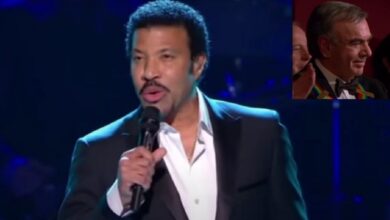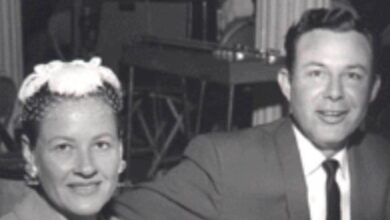Listening To Marty Haggard’s Son Sing His Father’s Song Brings Us To Tears
“Mama’s Hungry Eyes” is a profoundly touching country song first penned and performed by Merle Haggard in 1968. This track serves as a heartfelt tribute to Haggard’s mother, shedding light on the personal struggles and sacrifices she made while raising her children alone after her husband’s passing. The original lyrics vividly portray the challenges faced by a mother who, despite her own difficulties, tirelessly cared for her family with boundless love and strength.
Merle Haggard’s performance of “Mama’s Hungry Eyes” encapsulates the essence of his mother’s sacrifices through its rich storytelling and emotional resonance. The song’s sincere narrative strikes a chord with many, highlighting themes of familial loyalty and the deep respect Haggard held for his mother. Its straightforward yet impactful melody complements the moving lyrics, establishing it as a timeless classic in the realm of country music.
In homage to his father’s legacy, Marty Haggard, Merle’s son, later put his own spin on “Mama’s Hungry Eyes.” Released years after the original, Marty’s rendition expands upon the original with added lyrics that provide a fresh perspective. His version features a new verse that sheds further light on the challenges Merle’s mother faced, emphasizing her determination to support her family, even while juggling multiple jobs. This verse describes her work at a truck stop, washing dishes and plates, and despite her exhaustion, she always found the strength to sing to her children, creating a sense of comfort and home for them.
Marty Haggard’s rendition preserves the emotional heart of the original while showcasing his distinctive vocal style and interpretation. By doing so, he honors his father’s legacy while also adding a new layer to the song, celebrating his mother’s contributions through his artistic lens. This adaptation reflects Marty’s reverence for his father’s influence and his appreciation for the story told within the song.
The influence of “Mama’s Hungry Eyes” goes well beyond its lyrics, resonating strongly with audiences who find comfort in its messages of family devotion and resilience. The song’s lasting appeal stems from its authentic depiction of struggle and love—elements that are universally relatable and continue to resonate with listeners.
The legacy of “Mama’s Hungry Eyes” illustrates the power of storytelling in country music. It captures the raw emotions of a personal journey while exploring broader themes of sacrifice and resilience. Both Merle Haggard’s original and Marty Haggard’s adaptation contribute significantly to the song’s enduring importance, underscoring the value of family and the impact of individual narratives within the larger tapestry of country music.





